This article about the best travel booster seat is written by certified Child Passenger Safety Technician Melissa Conn and may contain affiliate links.
If you’ve been traveling with your kids since they were tiny, finally getting to the booster stage will feel like winning the jackpot! After years of lugging around a car seat that’s bulky and heavy, now you can rest easy: there are plenty of amazing booster seats for travel that will keep your kids safe and slip easily into your carry-on luggage.
What’s the best travel booster seat for your kid? That depends a little on them and a little on you! In this article you’ll find candid reviews of some of the best portable booster seat choices in 2023 as well as guidance on what to look for when you’re shopping for a lightweight booster seat. If you’re on the hunt for the best travel booster car seat, this is the article for you.
While you’ll find many similar “reviews” and roundups online, our family actually owns many of the booster seats on this list, and we’ve used some of them full-time. In the reviews below you’ll find plenty of hands-on, real-world experience to help guide your choice in addition to my expertise as a certified Child Passenger Safety Technician.
- Quick picks: best travel booster seat options
- Portable Booster Seat Comparison
- How to choose a portable car booster seat
- Ride Safer Travel Vest review
- Best travel highback booster seat options
- Best backless booster car seats for travel
- Tips for traveling with a booster seat on an airplane
- Best booster seats for travel FAQs
- You might also like…
In case your curious, here’s a sampling of our collection of travel booster seats as – I’ve even added a few more since taking this photo:
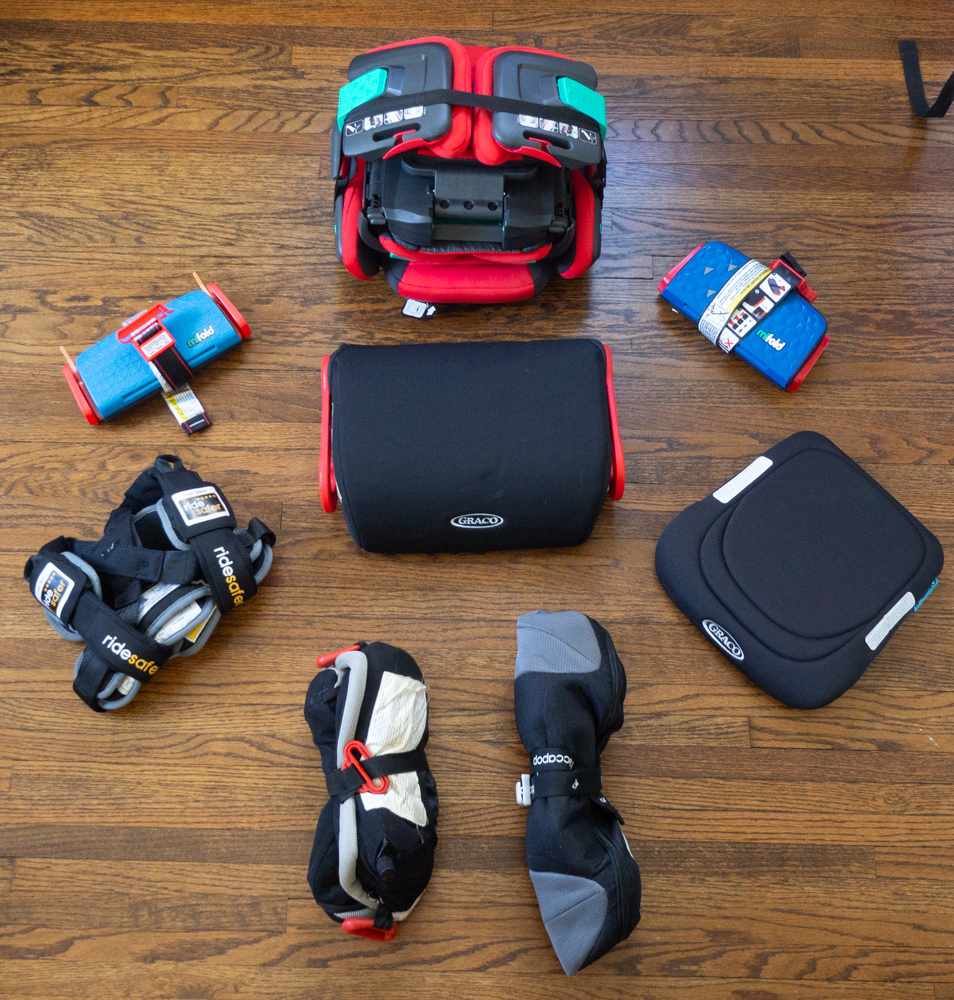
Unfortunately, as of 2023 some of these excellent booster seats for travel have been discontinued or out of stock. As such, I’ll provide alternatives in the reviews below.
Quick picks: best travel booster seat options
If you want to skip the details, here are my top picks for the best travel booster car seat:
- Ride Safer Travel Vest – age 4-6; booster seat alternative perfect for lightweight travel with preschoolers (full review here)
- Peg Perego Viaggio Flex 120 – age 5-10; folding highback booster seat with tons of great features (also available here)
- Bubblebum – age 6-9; inflatable booster seat for mature kids who don’t sleep in the car (full review here)
- Cosco Rise LX – age 6-10; lightweight, affordable option
DEAL ALERT! Save $11 off the Ride Safer Travel Vest with coupon ‘VOYAGE‘
Portable Booster Seat Comparison
| Travel car seat | Size | |
| Ride Safer Travel Vest |  | booster seat alternative; 2 lbs |
| Baby Trend Yumi | 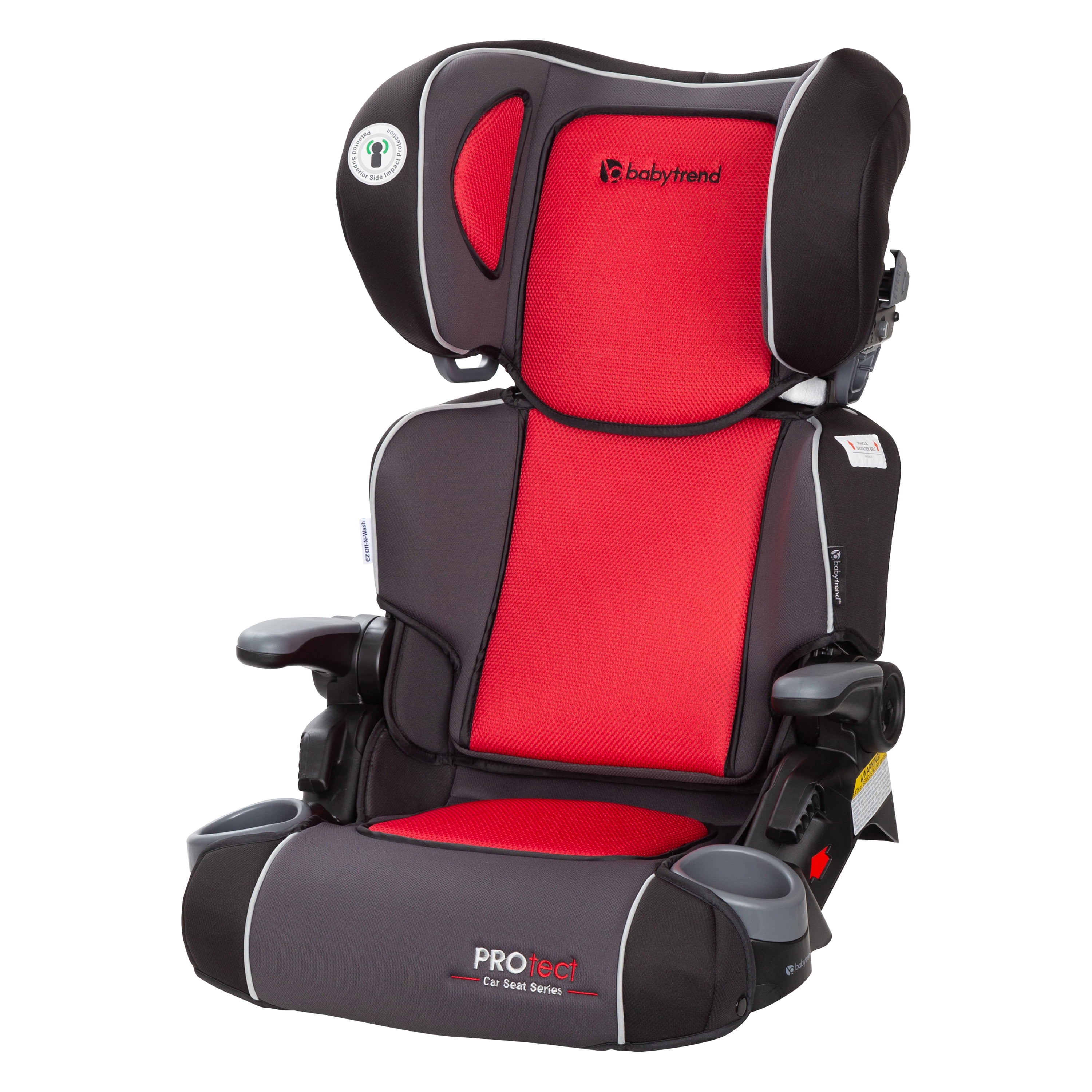 | highback booster or backless booster; 9 lbs |
| Peg Perego Viaggio Flex 120 |  | highback booster; 15lbs |
| Diono Monterey 5iST |  | highback booster; 19lbs |
| Bubblebum |  | backless booster seat; 1 lb |
| Chicco GoFit Plus |  | backless booster seat; 5 lbs |
| Cosco Rise LX | 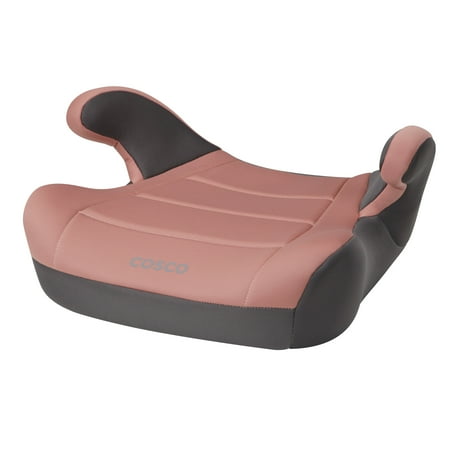 | backless booster seat; 2 lbs |
If you prioritize comfort over portability, check out these extra-comfortable booster seats that are great for family road trips!
Still researching? Pin this for later!
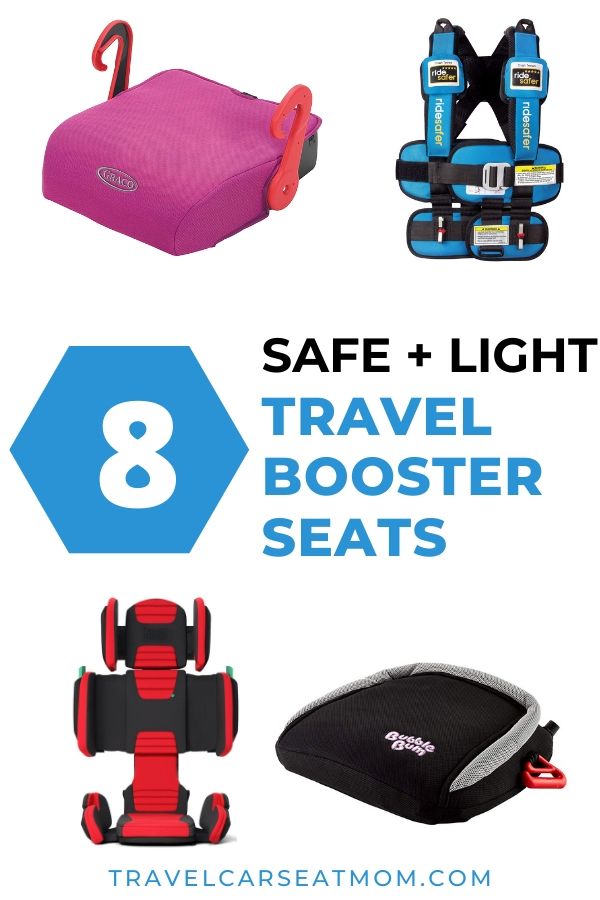
How to choose a portable car booster seat
Before you buy a travel booster car seat, it’s important to think honestly about your child. Is he big enough to meet the minimum requirements of the booster seat for traveling that you’re considering? Is she mature enough to sit properly in the seat 100% of the time? That means no bending down to get a tablet that falls down or putting the shoulder belt under her arm because it annoys her. Will he fall asleep in the car if he’s jet lagged after a long flight?
These are all things you’ll need to consider before jumping into traveling booster seats. In my experience, many kids are ready to transition to a backless booster for travel at age 6 (though there were a few times during our gap year when our 6yo fell asleep and I wished we had something different for him). Our younger one did great in the Ride Safer travel vest from age 3.5 to around 6, at which time she switched to a highback booster seat for travel since she was still a car sleeper.
What should you look for in a portable booster seat for travel? Here are a few suggestions:
-Choose between Ride Safer travel vest, highback booster and backless booster based on your child’s age, size and how much they sleep in the car
-Look for one that is light enough and compact enough to take as a carry-on or out in the city for the day
-Ideally it should last at least 3-4 years
Every trip may have different needs, too. If your travels involve lots of driving you’ll want to make sure you choose a comfortable option. On the other hand, if you’ll just be taking a quick taxi ride from the airport to the city center then portability might be more important than cushy padding or supportive headwings.
As you can see from the criteria above, there’s no one “best booster seat for travel”. Once you know your family’s needs, you can pick the right travel booster car seat. As you can see below, there’s a huge variety of portable booster seat options on the market today.
Read more: Bringing your booster seat on an airplane
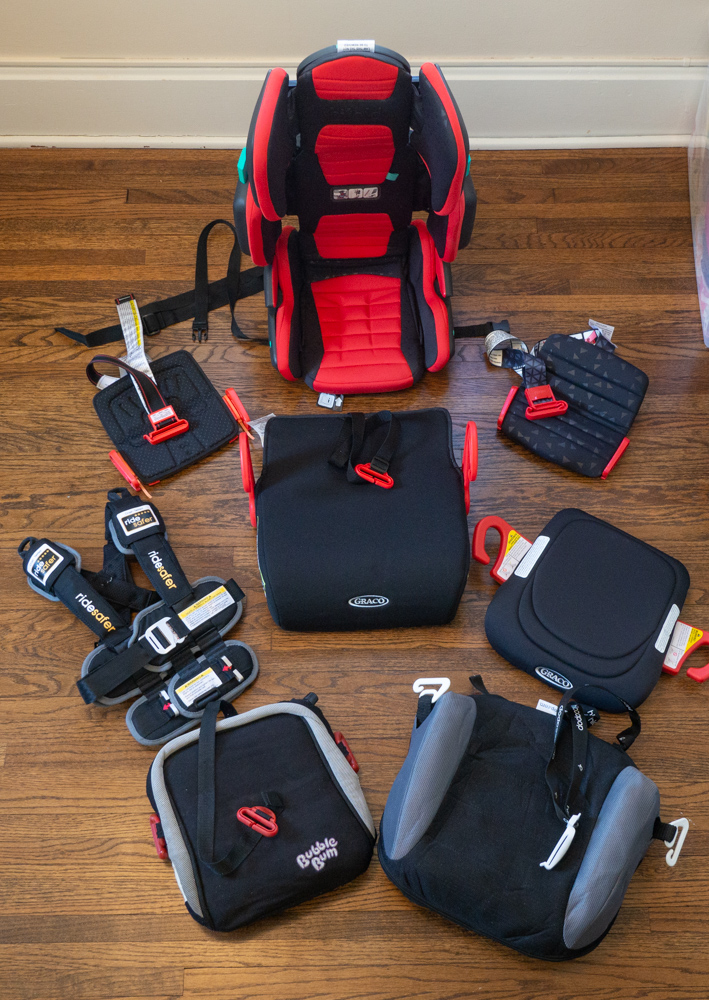
Ride Safer Travel Vest review
Key stats:
-Weight 2lbs
-Size small: minimum age 3, fits best for 30+ lbs and 35-47″
-Size large: minimum age 4, fits best for 50+ lbs and 45-57″
Pros:
✔ Rolls up to the size of a 2L soda bottle
✔ Perfect for taxi rides
✔ Lowers seat belt to provide an appropriate fit for young children
✔ Keeps kids properly seated better than a traditional booster seat – even when sleeping
✔ Easy to fit 3-across since it’s only as wide as the child
✔ 5 year expiration
Cons:
✘ No side impact protection like a highback booster seat
✘ Takes practice to get belt fit right
✘ NOT permitted for use on planes
Several years ago the kind folks at Safe Ride 4 Kids sent us a Ride Safer travel vest to review, and it hasn’t left our travel kit since. The Ride Safer travel vest is completely different than the other travel car seats and booster seats on the market.
You could say that the Ride Safer travel vest is sort of in between a booster seat and a traditional forward-facing car seat. It relies on the car’s seat belt to handle most of the restraint, but also has an optional top tether that minimizes head movement in an accident and keeps your child in the correct position even if they fall asleep (or drop a toy). While our youngest child wasn’t ready for a booster seat yet at 6 since she was a car sleeper – especially when jet-lagged – we were comfortable with her riding in the Ride Safer vest.
DEAL ALERT! Save $11 off the Ride Safer Travel Vest with coupon ‘VOYAGE‘
So comfortable, in fact, that we brought our Ride Safer vest on our year-long trip around the world! It’s seen action on six continents and served us well the whole time. Once we practiced a few times, we got very fast at putting her in the vest and getting her secured in the car. The newer version features an easier buckle in the front and more adjustability, so that should help many parents.
The Ride Safer Gen 5 is rated for kids beginning at 3 years old and 30lbs, but honestly we felt that the fit was better starting at 3.5 or even 4 years old and other parents agree with us. Fortunately size small should last most kids until 6 or even 7 thanks to the adjustable shoulder strap length. It also comes in large and XL sizes to accommodate kids who are older or bigger but still not quite mature enough for a booster seat. Because there’s no side impact protection, it’s a good idea to put your Ride Safer in the middle seat.
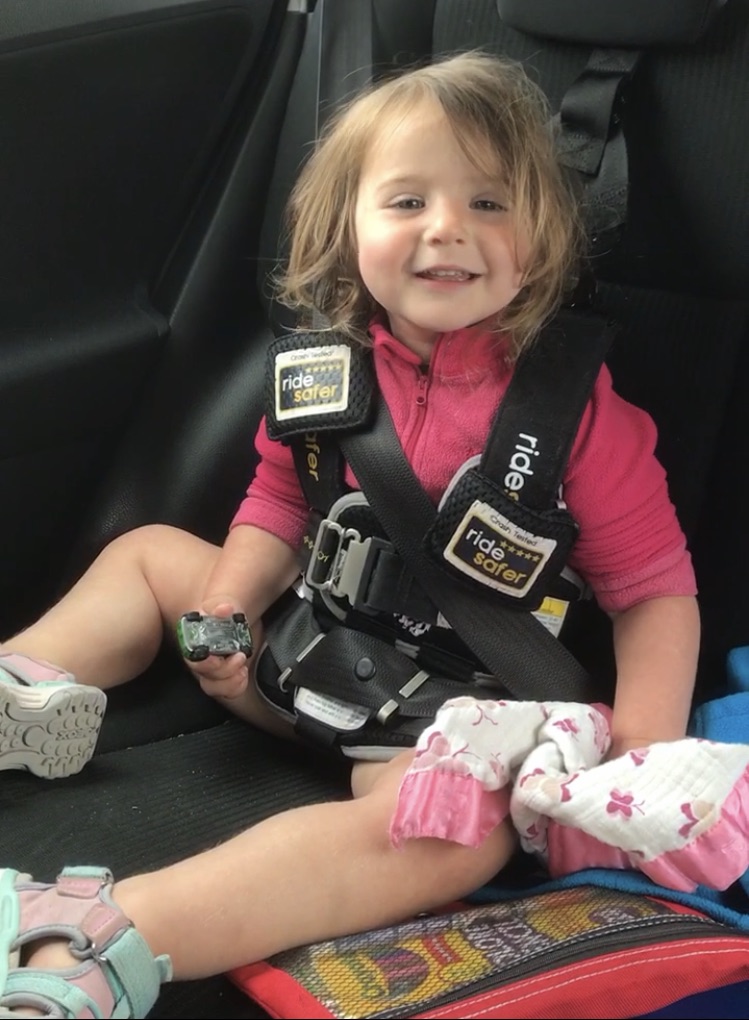
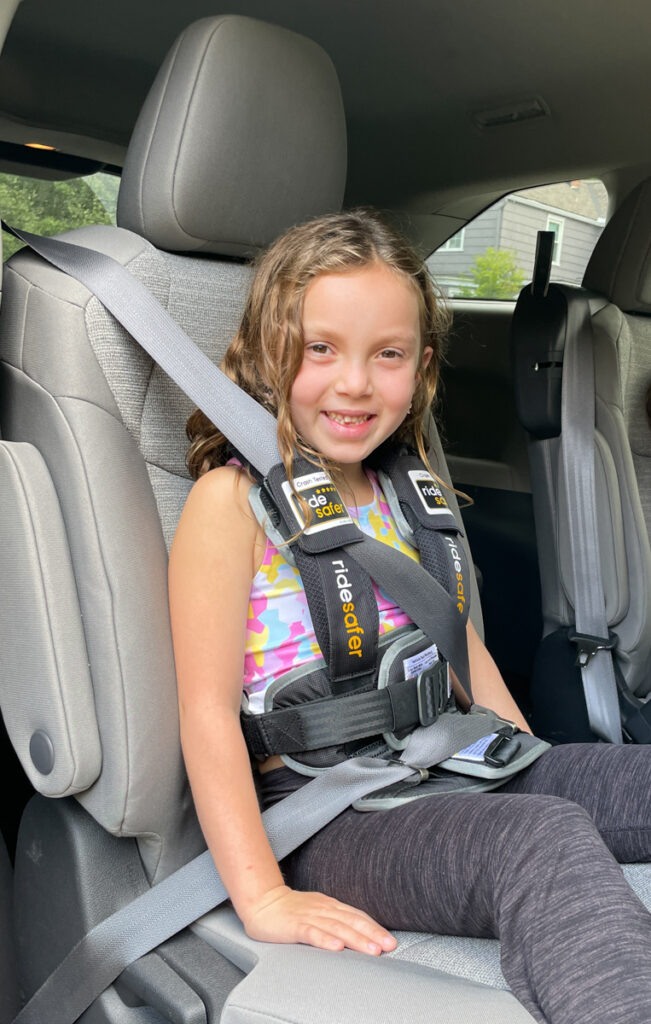
For families going on extended journeys like ours who just can’t take a traditional car seat or those heading somewhere like NYC or Paris, where they’ll mostly rely on public transportation but need an occasional taxi ride, the Ride Safer travel vest is a fantastic option.
For a more typical trip that involves flying and then renting a car for a week or two, we sometimes opt to bring our other travel car seat. But if you’re choosing between the Ride Safer travel vest or a backless booster seat, the vest is the better choice for younger kids and/or car sleepers.
While we generally think of the Ride Safer as a travel car seat alternative, we also use it at home often. I keep it in my trunk at all times so that we can fit 3-across in our car for those unexpected carpools or for when Grandma comes for a visit! Since the vest is as narrow as the child in it, there’s no trouble fitting it between two big car seats in our compact SUV.
Best travel highback booster seat options
Ok, so what if you feel like your child year old is mature enough (and big enough) for a compact high back booster seat? There are a few great choices to consider for the next stage.
Peg Perego Viaggio Flex 120 Booster Seat review
Key stats:
-Weight 15lbs
-Highback booster size limit 40-120lbs, up to 63″
Pros:
✔ Steel reinforced frame
✔ Rigid LATCH
✔ Tons of size adjustments for a great fit
✔ Reclines for sleep
✔ Extremely narrow
✔ 10 year expiration
Cons:
✘ Really expensive
✘ No arm rests
✘ Heavy
✘ Folded size is as big as a carry-on suitcase
For a long time, I hesitated to recommend this next seat as a travel booster seat due to its high price tag. However, in light of so many discontinuations of less expensive and lighter competing seats, I’m bumping it up in the list.
The Peg Perego Viaggio Flex 120 has some great features, but a price tag to match as well. You can generally get it cheaper here with their coupon. It’s hard to fathom spending that much on luxury foldable high back booster car seat that doesn’t have any other modes available. However, some of the premium features make it a solid choice.
First off, it’ll last forever… or at least as long as you want it to. The upper size limit is a whopping 120 lbs and 63″, which is the size of a petite adult. Most riders that size will fit in a seatbelt just fine without a booster seat so you may not ever need a backless booster. The other piece of lasting forever is that Peg Perego gives 10 years until expiration of this seat. If you have a second child (or third or fourth!) they’ll be able to get a few years out of this seat as well.
Second, it’s loaded with reassuring safety features. The Viaggio Flex 120 has rigid LATCH connectors to easily install the booster seat and keep it from moving around, while most of the other booster seats on this list don’t have LATCH at all to save on weight. The back of the seat is also steel reinforced for additional safety.
Third, kids generally like it. It’s padded, it has folding cupholders on each side and the lack of armrests (though a downside for long drives) means it’s easier for booster-age kids to buckles themselves. You can even recline it on the fly after installing with rigid LATCH to allow your kids to rest a little. It’s also a really narrow car seat, which helps if you’re trying to squeeze three kids in the back row.
So what’s wrong with this child safety booster seat, other than perhaps the price? It comes down to the portability aspect. The steel reinforcement and rigid LATCH add an extra 5-6 pounds compared to competitors, making you less likely to sling this one over your shoulder and use it out on the town. It’s not even close to the most lightweight booster seat for travel. Likewise, it’s not all that small when folded – about 2′ long! You’ll be lucky to fit it in the overhead bin, but taking it when you walk around a city means you’ll need a really big backpack to carry it.
The best use for the Peg Perego Viaggio Flex booster seat is probably when you’re flying to head on a road trip and won’t be moving it in and out of cars all the time. It’s an especially good choice for those situations if you’ll need to fit 3-across in a rental car since it’s so narrow.
hifold fit-and-fold Booster review
Key stats:
-Weight 10lbs
-Highback booster size limit 4yo, 40-100lbs, 40-59″
-Belt guide 14-20″
Pros:
✔ Tons of size adjustments for great fit
✔ Folds down small
✔ Legal to use everywhere except Australia (in progress)
✔ Extremely narrow
✔ 7 year expiration
Cons:
✘ Expensive if you will only use for a few years
✘ No cup holders included
✘ Bigger than some of the other travel-specific car seats
Sometimes I can get just a little too enthusiastic about innovative car seats. In this case, I’m pumped. While I’ve never been totally sold on the belt fit of the mifold backless booster, the company’s new hifold Fit-and-Fold highback booster car seat looks amazing for city-dwellers and travelers alike. No joke.
Read more: My in-depth hifold review
What’s so cool about the hifold folding booster seat? While the weight is nothing to write home about at 10lbs, it folds down into an ultra-compact package – 13.5″ square and 10″ high. That means it’s easy to carry around in a backpack, throw it in your trunk or even stow it in the overhead bin of most airplanes. Of the folding booster seats (would you believe that there are a few choices now for folding highback boosters?) it’s the lightest and folds the smallest. It’s the best foldable booster seat with a back for taking as a carry-on.
The hifold booster is extremely adjustable to offer the optimal fit to booster riders of all sizes. There are three widths for the seat, three widths for the body, three widths for the head and nine height settings! They claim to offer 243 individual settings. That means it’ll fit new booster riders just as well as kids who are ready to transition to an adult seatbelt. For those of us with kids who are small for their ages but mature enough for a booster, the hifold car seat is a fantastic option as a travel high back booster seat.
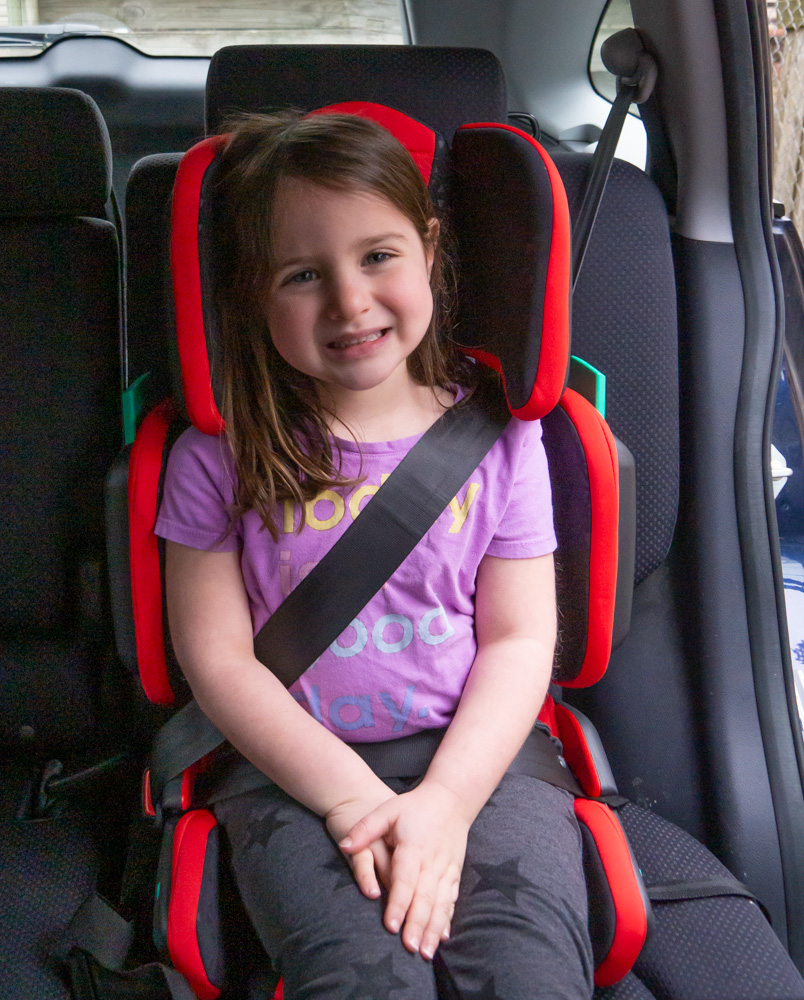
It’s also one of the narrowest high back boosters available, so it’s really helpful if you need to fit three car seats in a small car (whether at home or a rental on vacation). Overall it’s a great travel car seat for 6 year old kids on up.
Ok so why wouldn’t everyone run out and buy a hifold? Unfortunately all that innovation doesn’t come cheap. Don’t get me wrong, I think the price is completely reasonable for what you get; however, the seat is something of a one-trick pony. There’s no harness for kids who aren’t mature enough to stay in position all the time, and it doesn’t convert to a backless booster seat when your child is ready to ride that way. Many families will feel ready to bring a lightweight backless booster around 6 or 7. So the typical usage for many families will be around two years (let’s say 5-7, or perhaps 4.5-6.5 for families who feel comfortable transitioning to the “next stage” early). If you travel a lot or have a younger sibling to use this in the coming years, it’s definitely a worthwhile investment.
The hifold is a great choice for a kid who is mature enough to ride in a highback booster seat but would still benefit from some extra support when sleeping. It’s also a great choice if you’re visiting a place like the EU or Costa Rica, where recent laws have pushed for younger booster riders to stay in a highback booster and increased the age for backless boosters to much older stages. In fact, it’s even approved everywhere in the world except Australia – and that’s in the works. It’s a really slim booster seat so you won’t need to size up your rental car to fit two of them side-by-side.
Babytrend YUMI Folding Booster Seat review
Key stats:
-Weight 9lbs
-Highback booster size limit 40-100lbs, 38-57″
-Backless booster size limit 40-100lbs, 42-57″
Pros:
✔ Highback mode lasts until kids are ready for a backless booster
✔ Converts to backless booster
✔ Bargain price
✔ Cupholders and cushy padding for long drives
✔ 9 year expiration
Cons:
✘ Folded size is as large as a carry-on suitcase
If you’re shopping for a bargain travel booster seat, here it is. The Baby Trend Yumi folding booster seat has been around for a long time under different names and was a pioneer in this type of product. But is this foldable booster car seat still worth buying?
The highback booster size limits are a little lower than the hifold above, but when your child is ready you can remove the back to use it as a no back booster seat that goes all the way to 100 lbs (theoretically – in practice, it would probably be too narrow for a 100lb tween to be comfortable). Combined with the rock-bottom price tag, the Baby Trend Yumi 2-in-1 folding booster seat is an incredible value. (Note: The previous version of this seat did not convert to a backless booster and is even cheaper.)
A big plus of the Baby Trend Yumi is that it’s a booster seat designed for everyday use. It’s got cupholders and plenty of cushy padding. That makes it a great choice if you plan to fly somewhere and then take the kids on a long family road trip. Other folding booster seats like the hifold might not win kids’ hearts on a six hour drive, which of course means less peace for us parents.
The big downside of the Yumi is the fold. Whereas the hifold collapses into thirds to make an ultra-compact package, the Yumi’s fold just isn’t as small. While you might be able to fit the hifold under the seat in front of you, the Baby Trend Yumi definitely has to go in the overhead bin – and possibly sideways, depending on the size of the plane. With overcrowded bins the days there’s something to be said for a tiny package that won’t attract the attention of the flight crew!
For families on a budget or those with long drives ahead, the Baby Trend Yumi is worth a serious look.
Diono Monterey 5ist Booster Seat review
Key stats:
-Weight 19lbs
-Highback booster size limit 40lbs/38″ to 120lbs/63″; max belt guide 21″
Pros:
✔ Folds for compact storage
✔ Easy for kids to buckle
✔ Side impact tested
✔ Rigid LATCH for quick installation
✔ Very roomy, width adjusts to fit even the biggest kids
✔ Highest weight and height limits of any booster
✔ 8 year expiration
Cons:
✘ Heavier than other folding booster seats
✘ Too wide for 3-across as kids get taller
If you’re looking for the best travel booster seat for a child who will just be traveling to Grandma’s house now and then, put the new Diono Monterey 5iST on your consideration list. It’s not the lightest booster seat on this list, but it has a ton to offer.
First off, the Monterey 5iST adjusts tall enough and wide enough to last nearly every kid to the end of their boostering days (it’s officially rated to 63″ and 120lbs). Since it’s good for 8 years, if you buy it now you may not need to buy your child another car seat or booster seat ever again.
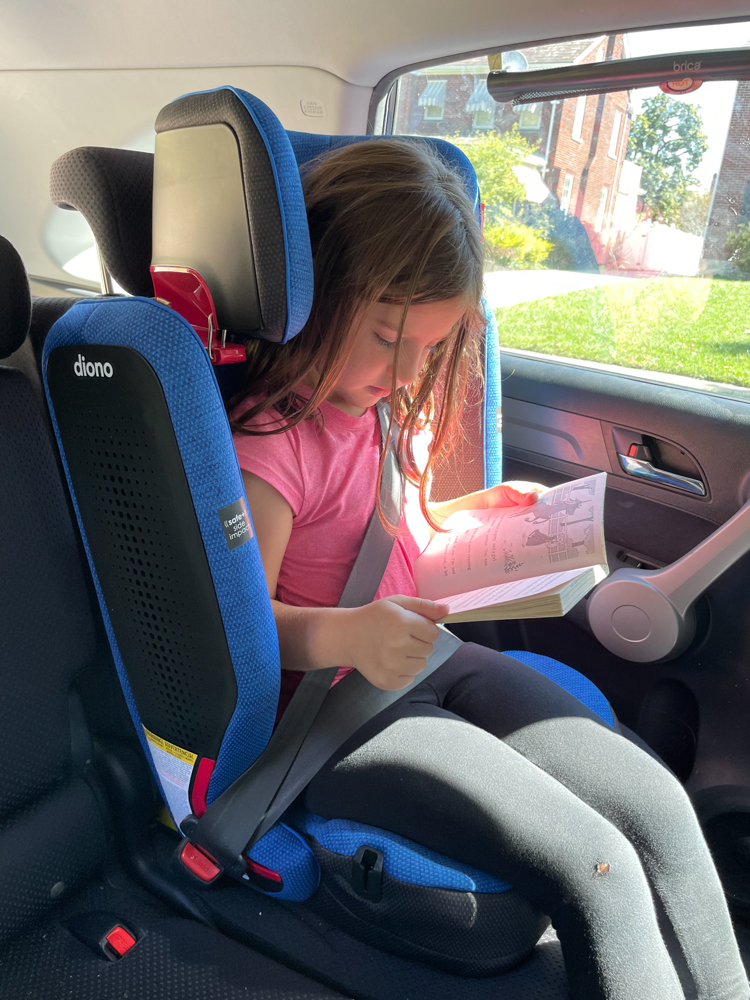
When you do plan to take that occasional flight, the 5iST folds to about the size of a domestic carry-on suitcase so that you can probably fit it in the overhead bin (YMMV depending on the airline and aircraft). I hope that the next version will have more supportive staps – or even a hip belt. Alternatively, you can just leave it at Grandma’s and she won’t even notice it in the closet since it folds so compactly.
The Monterey 5iST has plenty of great features: side impact protection, rigid LATCH, unbeatable ease-of-use and more. Subjectively, it also feels extremely sturdy. This is a wonderful everyday booster seat.
My kids absolutely love the booster we received from Diono. You can read more in my in-depth Diono Monterey 5iST review, but my 10 year old is so enamored that he’s chosen to ride in it full-time. That’s high praise from an image-conscious tween!
Best backless booster car seats for travel
Using an ultra-portable backless booster seat can make your travels so much easier! We made the switch when our older child was 6 years old, mature enough not to wiggle around and rarely fell asleep in the car. Our younger child isn’t ready yet at 6 years old, so she still rides in a harnessed car seat – even for travel. Read these backless booster seat reviews to help you choose the right one for your family:
Bubblebum booster seat review
The best backless booster seat for travel is one with which we’re extremely familiar: the Bubblebum inflatable booster seat. We traveled full-time with this booster seat for the better part of two years.
The Bubblebum travel booster seat is pretty amazing. It weighs about one pound and deflates/rolls to the size of a soda bottle – it’s a truly packable booster seat. Setting it up takes just a few seconds, and there’s even a shoulder belt guide to give a great fit for kids of different sizes in all different vehicles.
If you’re a family with a mature kid who doesn’t sleep in the car the Bubblebum gives you the paragon of portability. It’s the perfect option for taking around on days in a city when you think you might hop in a taxi to get home at night or if you’re taking lots of planes and trains for an extended trip.
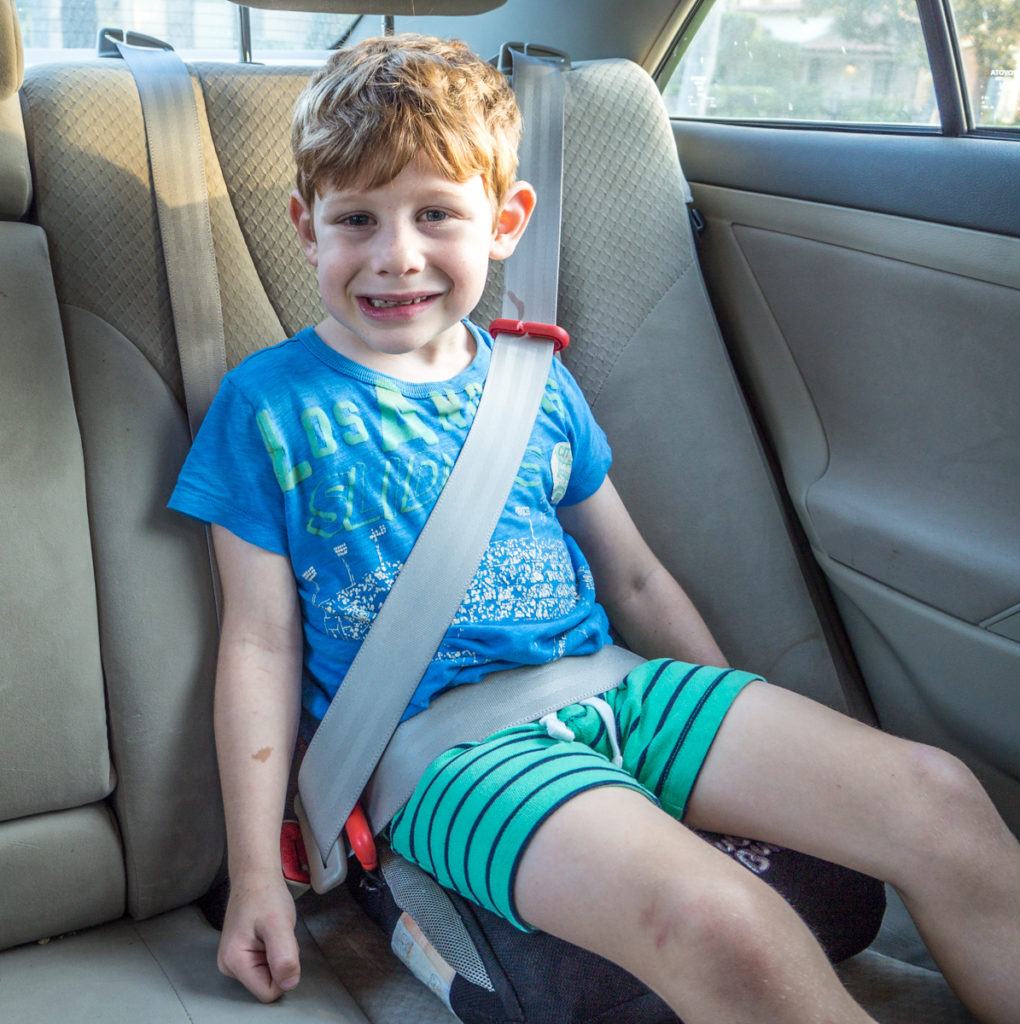
The Bubblebum is so light that it may shift if your kid is very wiggly. But if your kid is very wiggly, they may not be ready for a backless booster yet. In that case, I’d go with the RideSafer travel vest for an ultra-portable option or one of the high back booster seats for travel listed above. We also had an issue with one of our Bubblebums deflating after we left it inflated in a hot car for a month (oops!); we reached out to customer service and they sent us a whole new one for just the $7 shipping charge!
We started using this booster seat at 6 years old, and we think that’s about right. But it’s approved for 4 years old/40lbs and there are plenty of 5 year olds who can use it successfully, especially if your drives are short. This is a judgement call for each family and also depends on the specifics of your travels.
You can also read my in-depth review of the Bubblebum.
hiccapop Uberboost booster seat review
If you like the idea of an inflatable booster seat for travel, there’s a new option to consider these days. The newish hiccapop Uberboost follows the same basic concept as the Bubblebum but with a few pros and cons.
Read more: My in-depth hiccapop Uberboost review
The hiccapop packs down slightly smaller than the Bubblebum but inflates to offer a larger seating seating area. Score! It does that by keeping the inside of the booster seat completely empty (meaning it’s just a heavy-duty air bladder), while the Bubblebum has memory foam inside the booster seat to help it pass crash testing even when deflated. The hiccapop Uberboost also has a grippy layer on the bottom to prevent it from sliding around.
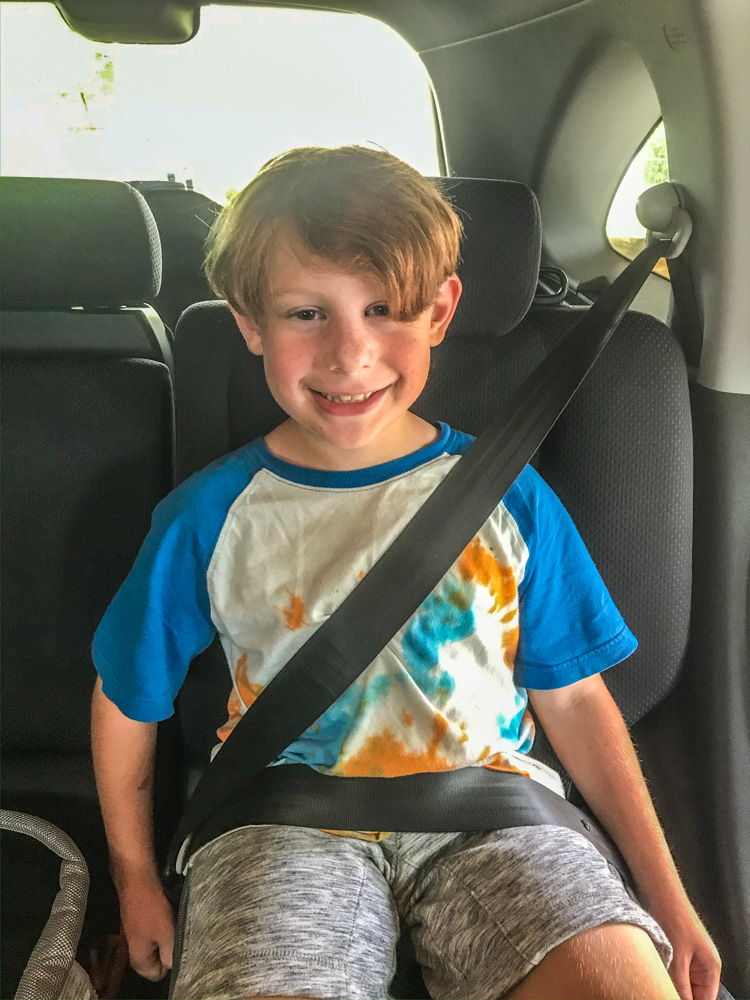
The biggest downside for us is that our leggy 48″ rider needs the shoulder adjuster clip in most seating positions but finds it very uncomfortable. The clip is much bulkier than on our other travel booster seats.
If your child is 48″+ or has a longer torso, you might be able to avoid using the clip – just be sure that the shoulder belt makes nice, complete contact with the middle of the collar bone. In that case the hiccapop Uberboost is a great choice for a traveling booster seat. For a smaller child, I’d stick with the Bubblebum for now.
Graco RightGuide booster seat review
Key stats:
-Weight 2 lbs
-Backless booster size limit 50-120lbs, 43-60″, age 5+
Pros:
✔ Extremely light booster seat
✔ Very compact booster seat when folded
✔ Narrow option for 3-across with big kids
✔ Inconspicuous option for tweens
✔ 10 year expiration
Cons:
✘ Belt guide may not stay in place securely
✘ Incompatible with some seatbelt designs
If you have a big kid or tween who’s approaching readiness for the adult seatbelt (usually 10-12 years old) but not quite there, check out the Graco RightGuide. It’s ultra low profile and easy to throw in a backpack or clip to the outside of a carry-on suitcase. It does require that kids be at least 5 years old, 43″ and 50lbs – a weight many kids don’t achieve until they’re around 7 or even older.
The RightGuide offers a wonderful seatbelt fit even for kids at the bottom of the stated size range. It can be problematic with certain types of seatbelts, so be sure to read my Graco RightGuide review to know what you need to look out for.
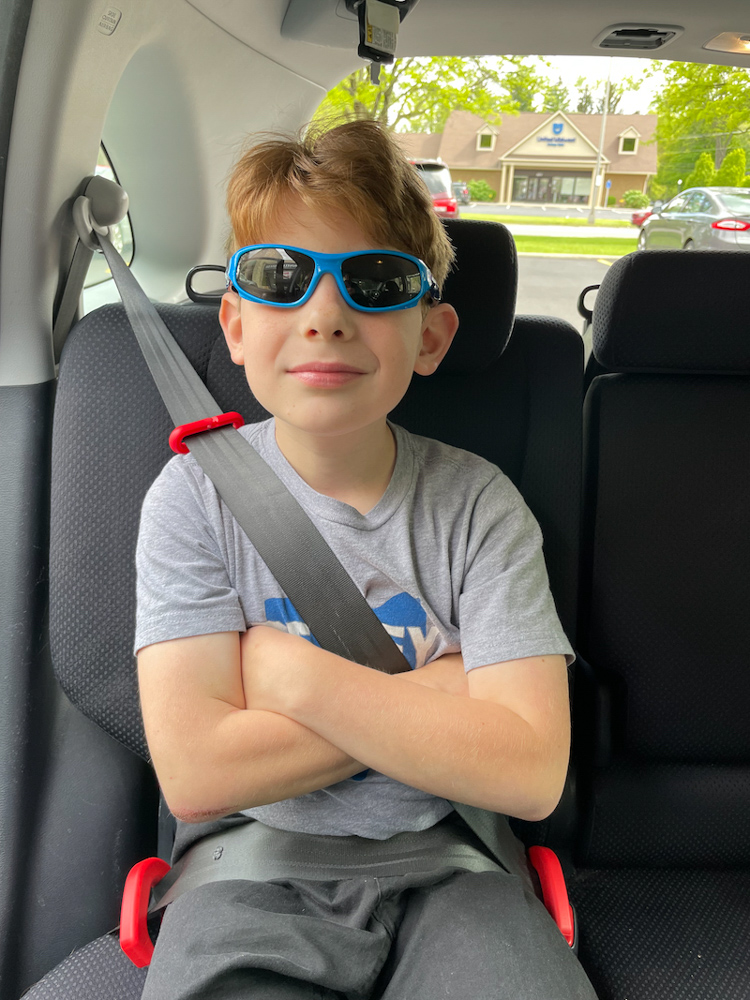
Cosco Rise LX booster seat review
Do you like the idea of a more “traditional” booster seat but want a more compact form for travel? Or do you worry that your child will outgrow the width of the Bubblebum too quickly? The new Cosco Rise LX might be your best travel car booster seat option! We own the original non-LX version and have used it extensively.
The Cosco Rise LX (and original) are the booster seat in its simplest form: you put it down on the seat and then your kiddo buckles and runs the seatbelt under the arm rests to place it properly on her body. If your child is on the shorter side, there’s also an attached adjustable shoulder belt guide to bring the seatbelt down low enough to cross her collarbone.
That’s it. It’s not a folding booster car seat, but at 2 pounds it’s one of the lightest booster seats on the market. It’s also incredibly affordable, coming in right around $20. I’ve used it for multiple kids ranging from 6 to 10 and the fit is good on all of them. Even if you never plan to use it for travel, this is a great one to have on hand as a spare since it’s the cheapest booster seat you can buy.
Check out my quick take:
The Cosco Rise is also the narrowest booster seat aside from Bubblebum at just 15″. That makes it a viable booster seat for 3-across, especially since it’s narrower at the back where your child will need to reach the buckle. We managed to squeeze one into the middle seat of our old CR-V between another narrow booster seat and an adult!
The biggest downside of the original version is the sparse padding, including none on the arm rests. This isn’t the seat my kids typically want to ride in for more than about 30 minutes, and we probably wouldn’t choose it for a long road trip if we had another choice. I recommend that you spring for the LX for just an extra $3-5, as it has more padding including on the arm rests.
Note that the minimum height for this booster seat is 43″ – many kids won’t reach that until almost 6 years old. Our son didn’t get there until almost 7 years old, so parents of shorter kids may need to look elsewhere. But the Cosco Rise LX may be the best booster seat for 6 year old globetrotters who need more hip room and prefer a stable seating area. On the other end of the spectrum, the Rise may not offer quite enough thigh support for the oldest booster riders since the seat is on the shallower side; at 11 years old, my son usually refuses it.
At 2 pounds, the Cosco Rise booster seat is one of the lightest booster seats available. It’s also extremely affordable! If your child is ready for a backless booster and you don’t mind the extra size or weight compared to the Bubblebum or if your child has outgrown the small seat of the Bubblebum, this just might be the best booster seat for travel.
Chicco GoFit Plus review
Key stats:
-Weight 5lbs
-Backless booster size limit 4yo/40lbs/38″ to 110lbs/57″
Pros:
✔ Great padding
✔ LATCH to secure it when unoccupied
✔ Nice, removable/foldable cupholders
✔ Long arm rests
✔ 8 year expiration
Cons:
✘ The 57″ height limit means tall kids might need another booster down the line
✘ Seat isn’t wide enough for kids at the top of the growth chart
We own the Chicco GoFit and love it! (Actually, if I’m being honest we now own four Chicco GoFits and three of them are permanently in my van.)
The padding is nice and squishy, the arm rests and cup holders are great and the price is very reasonable. It’s not terribly wide and the cupholders fold in to help it play nicely with other car seats. Installing the booster seat with LATCH is just as easy as with all of our other Chicco car seats.
This is one of the best car booster seat options for kids who are on the smaller end of the growth chart. If you have taller or broader kids, the seat may not be wide enough to hold them until the end of their booster days. There’s also a 57″ standing height limit, which may not work for the tallest kids.
This is the booster seat we use at home and the one we take for our child when we know we’re going to be doing a lot of driving at our destination. It’s extremely comfortable and has a great carry handle integrated into the back of the seat (it’s where the back would attach if you’d bought it as part of the KidFit highback booster seat, which we also have and like). On some planes my son has put the GoFit at his feet, while on other flights he’s put it in the overhead bin.
If you want to save a little money and a little weight, the original Chicco GoFit weighs about a half pound less than the Chicco GoFit Plus – the only differences are the lower anchors and fancier armrest fabric on the Plus.
Harmony Youth booster seat review
There’s beauty in simplicity. The Harmony Youth booster seat has been around for a decade but it still gets the job done. There’s not much to this seat, but there doesn’t really need to be.
It’s an extremely lightweight backless booster seat at just 2 pounds, so it should be easy enough for kids 6 and up to carry this on their own. The Harmony Youth booster gets excellent ratings for providing a safe fit for kids and it includes a shoulder belt adjustor strap for kids on the lower end of the allowed size range.
It’s also a solid choice to use at home, whether for your own kid or to toss in the trunk for an impromptu carpool. The best part? It’s one of the cheapest booster seats around.
The only downside for hard-core traveling families is that it won’t fold up to fit inside a backpack or luggage. You can definitely put it inside your checked hard-sided luggage or your child can carry it on and put it under the seat in front of her (or in the overhead bin), but if your travels will involve hopping on and off trains or taking Uber in a city just know that this booster seat stays at its full size.
Tips for traveling with a booster seat on an airplane
When you’re shopping for a portable booster seat, it’s important to remember that booster seats are not FAA-approved. That means you can’t use a booster seat on an airplane. From a safety perspective, that’s fine: your child will be over 40lbs, so the airplane seatbelt will secure her properly. But what should you do with her booster seat so it’s not lost or damaged?
Take it on board! There are a few ways to manage this. One option is to buy a folding booster seat from the list above. Some of these look absolutely amazing and we’re excited to try them! They fold up small enough to fit in the overhead bin of a plane or even in your child’s carry-on backpack so that you’re never separated from them. This won’t be an issue with any of the backless boosters we’ve recommended.
If you’re traveling with a highback booster seat the other option is to detach the bottom from the back and put the back in a suitcase. It’s ok to check the back that way because it’ll be protected by the suitcase and padded by clothing. You’d then carry the backless part of the booster on-board with you and put it in the overhead bin or under the seat in front of your kid. The only risk is if your luggage is lost or delayed, but at least in a pinch you could use the backless portion of the booster on its own.
Get the full scoop on flying with a booster seat
Best booster seats for travel FAQs
Most children are ready for the responsibility of sitting correctly in a booster seat after 5 years old, but sometimes not until 7 or even 8 years old. Don’t rush it! If they can’t sit properly in the booster seat, it won’t keep them safe in an accident.
There’s no single best option. Once your child is big enough and mature enough to ride in a booster seat (usually starting 5-7 years old), you’ll need to evaluate the options on this list to find the one that’s the best match for her size and the type of trip your family is planning.
The mifold booster seat passes all Federal crash testing in the US, otherwise it couldn’t be sold here. That said, the seatbelt fit is not consistently in line with how we expect booster seat fit to look. Namely, the lap portion of the belt often sits mid-way on a child’s thighs in a mifold rather than on the strong hip bones. The fit seems to vary by car and child, so it may not be a reliable choice for families who can’t predict which car they’ll be riding in on a trip.
What’s your favorite travel booster car seat? Tell us in the comments below!
Still searching?
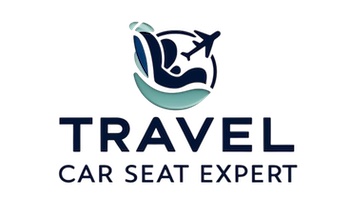
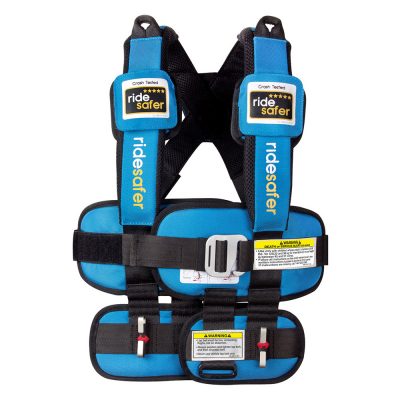



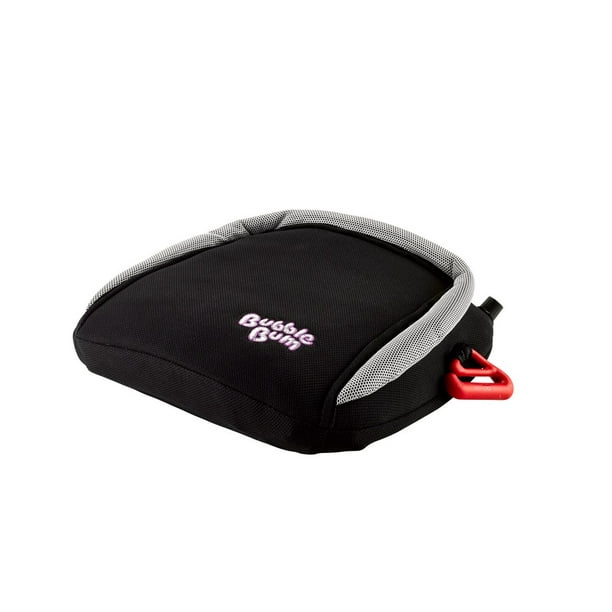

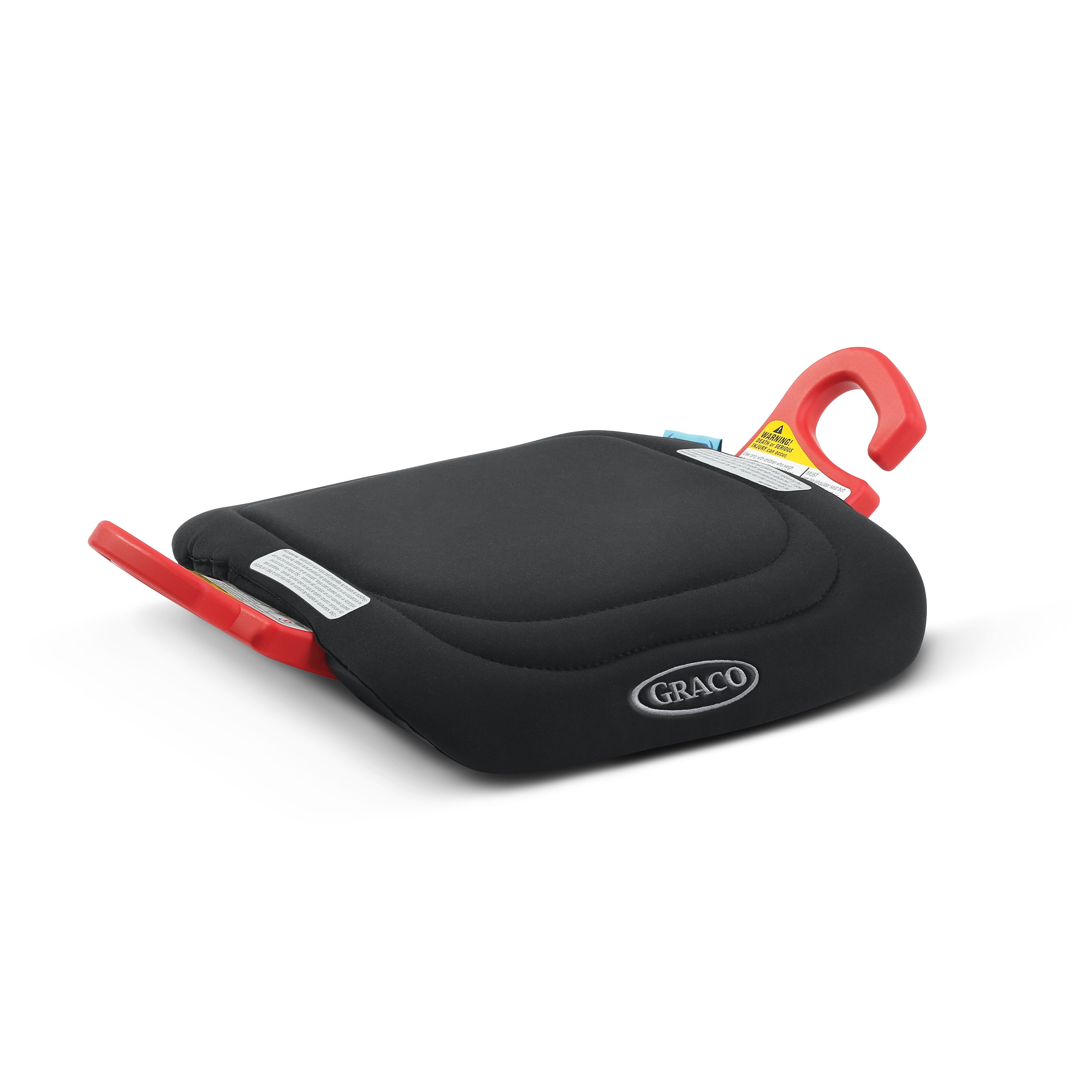

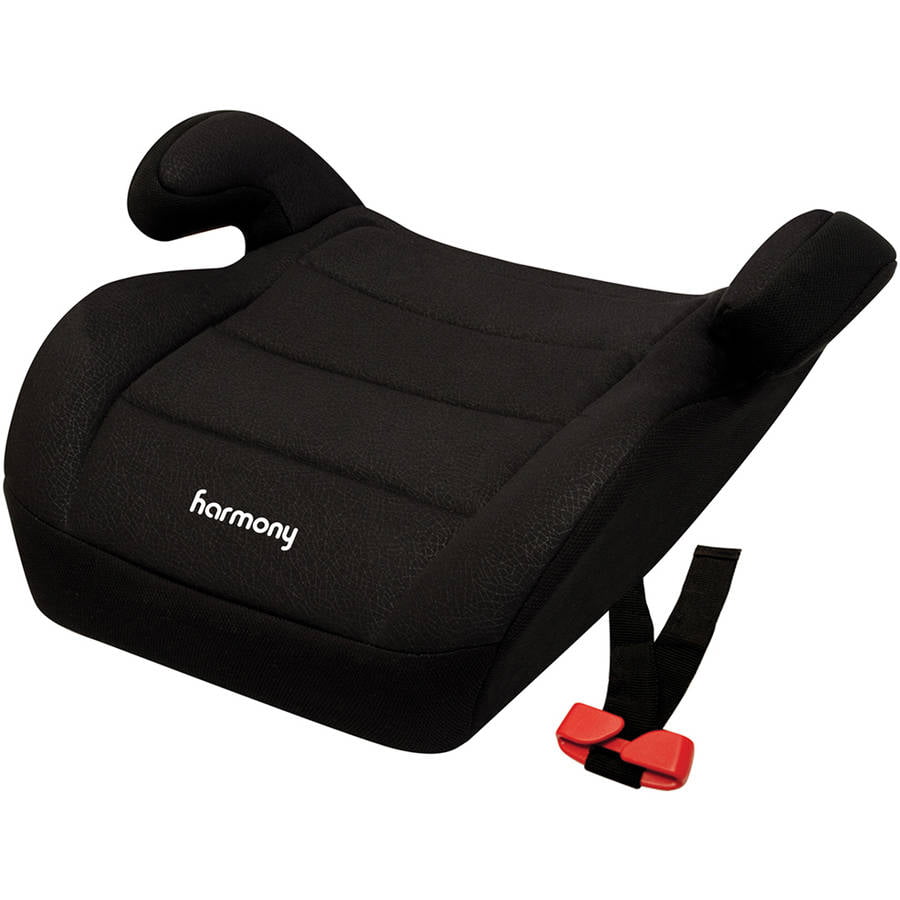
Thanks for this awesome post! I’m intrigued by the Ride Safer Vest. It seems very appealing in many of the safety features and of course the lightweight aspect, but I’m concerned about the lack of a back for the side impact protection as well as the ability to lean against it to sleep. I’m curious why you say it’s better for kiddos that sleep in the car? Also, how often are there tethering systems in the middle seats of vehicles? My son is 4.5 yrs old, 39 lbs, and 43″ tall. During normal times we travel quite a bit, including long trips in foreign countries where he would fall asleep in the car…I’m torn between this lightweight vest option vs. a 2-option booster seat (high backed and converts to low back). Thanks!
Hi Irene,
Thanks so much for stopping by! The Ride Safer doesn’t offer side impact protection (which is the same concern as a backless booster); if possible, it’s great to use the vest in the center for extra protection.
When you use it with the top tether, it prevents a sleeping kid from slumping over. A highback booster offers some side support that can help kids stay upright when they fall asleep, but a backless booster doesn’t support sleeping kids at all.
In the US, it’s extremely common to find top tether anchors in the center seats for sedans and small SUVs. Three-row vehicles are more variable – typically both captains chairs and one or two in the back (but sometimes three). In countries outside of US, Canada and Western Europe finding a top tether anchor is really variable. But we have found them in Australia, NZ, Argentina, Chile and beyond (I can’t promise always in the center seat, as we had each of our kids outboard).
At 4.5, a booster seat isn’t a safe choice – especially for a child who falls asleep in the car. Most 4 year olds can’t stay in position properly 100% of the time, which is what’s necessary for a booster seat to be safe. If the vest doesn’t suit your needs, check out these choices. If you wait until your son is a little older (and heavier) and ready for a booster seat, the hifold booster seat might be worth considering – it offers side impact protection, support for sleeping and is approved in EVERY country except Australia.
I hope this helps! Please let me know if you have any more questions.
Melissa
Thank you SO much for the incredibly detailed post!! It was super helpful for us as we are embarking on our full time travel adventure with 4 children. We are going to try the harness after reading several of your detailed posts. Thank you!!
Olivia Kimball from
The Minimalist Travel Family
Hi Olivia,
Congrats on going full time! It was an amazing period for our family. If you ever have any questions, feel free to drop me a line.
Safe travels,
Melissa
Have you had a chance to test the WhizRider? It seems similar to the other vest option but looks a little simpler to use…
Hi Katie,
Thanks for stopping by! Another CPST is writing up her review on it for me as we speak 🙂 Her initial impression (and mine) is that the WhizRider fit can be more challenging for kids on the smaller end of the approved range. It also doesn’t have the same structure to it, so it really just positions the seatbelt while the Ride Safer also spreads crash forces through the child’s torso instead of concentrating the in a few spots. WhizRider anticipates offering a top tether in the future but they don’t have it available yet.
If you want to share your child’s age, height and weight I’m happy to help you narrow down the choices to find the best one for your family.
Safe travels,
Melissa
Hello,
I love all of your detailed content. Thank you. Have you had a chance to review the Wayb Pico? I am intrigued by it but the cost gives pause and some of the other reviewers say the bottom buckle is too short to allow the child to grow into it longer.
Thank you!
Hi Leighann,
Thanks for stopping by! My kids were too old by the time the Pico was released but one of my colleagues reviewed it for me and I also have tons of feedback from traveling families who use the Pico. Check out this in-depth WAYB Pico review and let me know if you have any questions.
Safe travels,
Melissa
Hi, is the Ride Safer vest approved throughout the EU? Where can I find info on requirements by country? Heading to France and Spain soon with a 3.5 and 5.5 yr old. Thanks!
Hi Maya,
Thanks for stopping by! Unfortunately the current version of the RSTV is not approved anywhere in Europe on its own. There is an EU-approved backless booster than can be used in conjunction with the vest for your older one. Here’s my full take on car seats for traveling in Europe.
Safe travels,
Melissa
We bought a whizrider about a year ago for carpool and travel, but recently I noticed they stopped selling it at typical retailers. They put a letter on their website recently that said it wasn’t recalled, “but NHTSA has informed us that the WhizRider does not meet the definition of a Child Restraint System as defined in FMVSS 213”. Help! What does this mean? Is it not legal for me to use it anymore? If it helps, I am located in CA but plan to travel to MD soon and was going to use it..
Hi Lara,
I’m sorry you’re caught in the middle of this sticky situation. This is an ACTIVE topic of conversation in CPST circles.
Here’s the background: FMVSS213 has both design standards and performance standards. The makers of WhizRider have tested to the performance standards. However, the vest doesn’t fit neatly into any legally defined category of design standards. Does it appear to hold the seatbelt in place properly for kids age 6+? In my experience with my own kids, yes. But the reason you’ve never seen a review of it here on my site is because I haven’t been comfortable promoting a product that technically doesn’t meet FMVSS213.
What that means for you: If you live in a place where your child is required by law to use a booster seat based on age and size, WhizRider is not an option. If you are traveling to a state where the law doesn’t require your child to be in a booster seat (for example, a 7 year old in Florida) you may use it.
I know this is a crappy situation for you to be in. If you share your child’s age and height, I’m happy to help you evaluate your options.
Safe travels,
Melissa
Has your opinion about the Bubblebum changed at all in the wake of the computer model submarining question?
We used the Ride Safer vest when my kiddo was smaller and loved it (she used to pretend she was an astronaut or a racecar driver) but now she’s a very tiny 8 year old and we’re looking for a travel booster seat. She has a high-back booster as her regular seat, and we have a Graco Turbo as our carpool/visiting friend seat (visiting friends are ALWAYS bigger!), and we’re traveling a couple of times this year. I’m trying to decide whether it makes sense to bring the Turbo or get something more portable. I had been leaning toward the Bubblebum, but now I’m worried about it. What do you think? Bring the one we have, replace it with the Harmony or RightGuide (or maybe the super-cheap Cosco?), or relax and get the Bubblebum?
I’m interested in using the Ride Safer Vest for our next trip to NYC. Would you say that it’s more important to position our daughter in the middle of the back seat (for more side protection), or in a side seat that allows for the top tether (assuming the middle seat does not have that option)? She is 7. In the city/in a cab, she would be positioned between me and my wife.
We’ll also be doing a trip to Chicago and would like to use the same travel seat/vest. Part of our trip will involve driving on the interstate out to the suburbs. Do you trust this vest at interstate speeds? In this case, she would be alone in the back seat (and positioned in the middle, if possible.)
Hi Christina,
Thanks for stopping by! These are EXCELLENT questions.
NYC: All passengers vehicles in the US (since 2001 model year) are required to have three top tethers. That means in a sedan the middle seat always has one. You’re right that the middle seat, being furthest from the point of impact, is a great choice for kids using the vest.
Longer drives: Assuming your kiddo is able to sit properly and follow directions, there’s no safety concern about using the vest at high speeds. We used it full-time for the better part of two years. If used correctly, the vest adjusts the vehicle seatbelt to fit a child’s body similar to how a booster seat does. You can find lots of fit tips (and a discount!) in my detailed Ride Safer Travel Vest review.
Safe travels,
Melissa
Hi! I am taking my kids on a trip to Texas and was planning to us the two Whizriders that we have, instead of lugging carseats. My kids are 7 and 3.5. After more research, now I’m wondering if I can even use the Whizrider legally in Texas. Do you happen to know?
Hi Laura,
I’m so glad you stopped by! If you purchased a WhizRider new from a retailer, you should have received a letter informing you that it does not conform to FMVSS 213. As such, they are not legal for children under age 8 in Texas (who are required to use a booster seat). The fit on younger children isn’t very good, so I wouldn’t ever suggest using it on a child who is under ~6. Check out the Bubblebum booster seat for your older child.
You’ll want to bring a harnessed travel car seat for your 3 year old – all boosters in the US now have a minimum age of 4 years old, but most kids don’t have the developmental readiness to sit properly 100% of the time until at least age 5.
I’m sorry for your disappointment. You may be able to ask for a refund from the retailer who sold it to you. Please let me know if you need any more recommendations for your trip!
Safe travels,
Melissa
Question, is there any reason not to buy the Ridesafer Gen 4? I’m looking at getting two (used 5-10 times and 4 years old). It would save me a lot of money, just wondering if there are any HUGE downsides to getting them new.
Hi Megan,
As with any child restraint system, proceed with caution when buying used. You need to ask lots of questions about its history: Was it washed according to manufacturer instructions (if ever)? Was it in any type of crash? Are there any signs of physical wear? Are all of the accessories and manual accounted for?
I’ll say that our Gen 4 eventually had the buckle velcro separate from the body after HEAVY use, and SafeRide4Kids replaced it free of charge. If you choose to buy a new one, use coupon VOYAGE for a discount.
In terms of product changes, the Gen 5 runs bigger (not a good thing in my opinion) and it has an easier to use buckle plus fabric covering the tether attachment points.
Safe travels,
Melissa
Hi! We have 9yo twins who will (hopefully?!) be hitting that 50lb threshhold sometime soon (they’re between 45-49 (!!!) pounds). They’re both at just over 4 feet tall. One falls asleep in every car ride – after some investigation, it looks like she has a form of motion sickness that basically makes her pass out after about ten minutes in the car. Even in the current high-back booster (not travel-friendly at all – it’s the Clek Oobr highback), she pitches forward against the seatbelt when sleeping. We had a fold up travel seat that isn’t sold anymore – super heavy and bulky for travel. In this case, what would you suggest as the best option for travel? Thanks for any ideas!